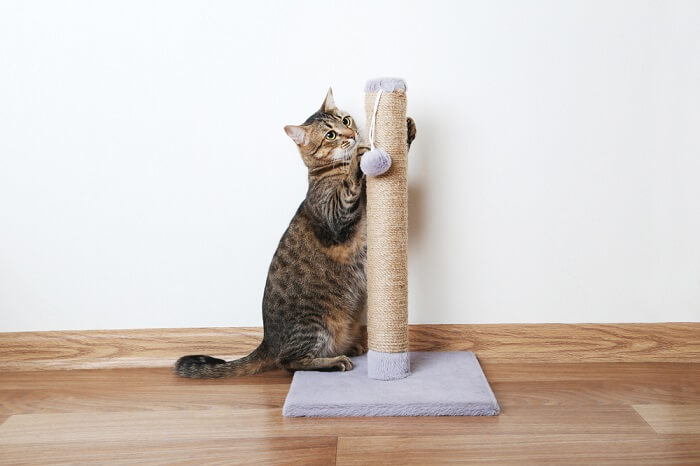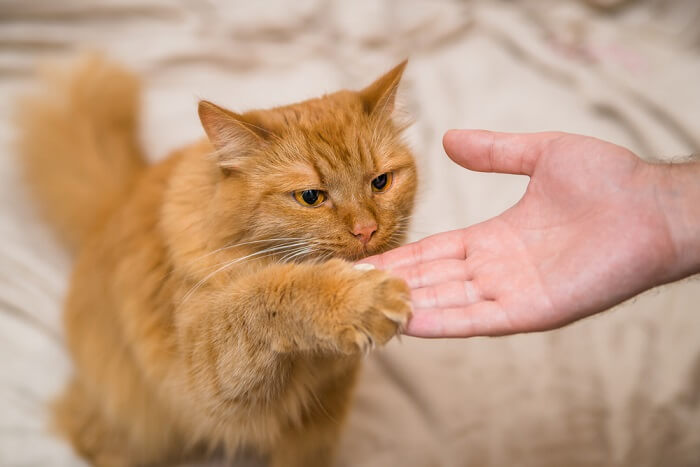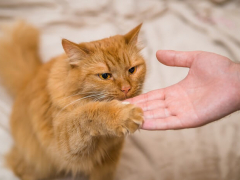If you share your home with a cat, you probably enjoy them curling up on your lap in the evenings and purring and rubbing against your legs when you get home from work. However, some things our feline pets do are less than ideal, like scratching furniture, stealing food from the kitchen counter, or peeing on the laundry pile.
Most of the behaviors that humans consider undesirable are natural cat behaviors that have a reason or purpose. Misbehavior is sometimes due to a medical issue, so get your cat checked out before trying other solutions. If your cat is engaging in undesirable behaviors, it's possible to adjust or redirect them to something more acceptable.Key Takeaways
If your cat is sometimes a bit naughty or behaves in a way you’d rather they didn’t, how can you stop them? Is it possible to train them to listen when you say no? Let’s find out more about cat training.
Common Cat Behavior Problems
It’s important to remember that most of the activities that we consider naughty are natural cat behaviors that have a reason or purpose so it’s important to first understand why your cat does something destructive or unpleasant, they’re not purposely trying to upset you. Here are some examples of unwanted cat behaviors and the reason behind them:
1. Scratching the Sofa
Your cat has scent glands on their paws and around their claws. When they scratch, they release their pheromones and scent-mark their territory. Ideally, this scratching would be done outside, or on an indoor cat tree, scratch post, or scratch mat.
Also Read: Correcting Unwanted Scratching Behavior Crash Course
However, if your cat feels anxious or insecure about their territory, or if they don’t have sufficient facilities to scratch in their environment, you might find they scratch in places you’d rather they didn’t.
2. Inappropriate Urination
If your cat urinates in the bathtub, the laundry basket, or somewhere else in the house that isn’t their litter box, it can be upsetting. However, inappropriate urination can be a sign of stress in cats because the bladder wall can become inflamed leading to cystitis.
Other urinary conditions like bladder stones and urinary tract infections can also cause similar signs. Rather than chalking it up to a naughty cat, contact your vet for a health check.
3. Stealing Your Food
Cats don’t view scavenging food as naughty—they’re simply taking advantage of an easy meal.
Cats are natural hunters and it’s part of their kitty instinct. If you think about it, hunting isn’t just a game of cat and mouse, it’s also opportunistic feeding. For your domestic cat, there’s not much difference between pouncing on an unsuspecting rodent, and stealthily nibbling some chicken that’s been left on the countertop!
Also Read: How To Train Your Cat in 5 Easy Steps
Do Cats Understand When We Say No?
Your cat may or may not know what you mean when you say “no,” but one thing’s for sure, they’re unlikely to listen to you in the long run if you shout or scare them.
Also Read: How To Teach Your Cat “No”
Shocking them with a loud noise, sudden exclamation, or spray of water from a squirt bottle might stop them in their tracks, but they’ll probably do the same thing again, given the chance.
They might even develop stress and anxiety as a result of your loud outburst or their unpleasant experience, which could lead to even more unwanted behaviors like pooping and peeing outside the litter box or overgrooming.
Also Read: 5 Visual Signs of a Stressed Cat and How To Help
How Do You Discipline a Cat That Won’t Listen?
When your cat does something that you find irritating or frustrating, it helps to remember they’re not intentionally misbehaving—they’re just doing what cats do. So, it’s best not to think of the solution as disciplining them or punishing them.
Also Read: How To Train Your Cat Not To Bite
If your reaction causes them a negative experience, you might assume they’ll choose not to act that way again. But, in fact, that’s unlikely to be the case, and you’ll probably create stress, which could make their behavior changes worse and even affect their health.
Is It Cruel To Spray a Cat With Water to Correct Their Misbehavior?
On that note, it’s best not to use anything that will shock, scare, or distress your cat. Collars and other devices that vibrate, make a loud or high-pitched noise, or even give your cat an electric shock are inhumane and should NOT be used.
Also Read: 10 Tips To Train Your Cat To Sleep All Night
Even spraying your cat with water from a hose, water pistol, or spray bottle is unnecessary punishment that is unlikely to be effective.
So, How Do You Stop a Cat From Misbehaving?
If you want to adjust or redirect your cat’s behavior, it’s about understanding the reason for the unwanted behavior than anything else.
Also Read: How To Train Your Cat To Sit: A 10-Step Guide
It’s also worth remembering that if your kitten is young and seems naughty, they’re still learning and developing. Your new family member’s mischievous side might not last to adulthood specially after spaying or neutering.
1. Get Them Checked by a Vet
The first and most important thing to do if your cat’s behavior has changed or become problematic is to see a veterinarian. The vet will check your kitty over to make sure there’s no underlying medical condition causing their behavior. They’ll also be able to advise you on the best way to improve their behavior.
2. Use Positive Reinforcement
Offer treats and other rewards when you catch your cat doing the right things.
As with training many animal species (as well as humans!), providing rewards and encouragement for good behavior is very effective. If your problem is that your cat pees in inappropriate places, give a treat, some petting, or some verbal praise when they use or show interest in their litter box.
Also Read: How to Retrain Your Cat to Use the Litterbox in 5 Simple Steps
This can also be applied to unwanted scratching and other destructive behaviors. On the other hand, if the problem is excessive meowing or stealing human food, provide rewards when they are not doing this behavior.
3. Avoid Punishments or Shouting
As you now know, negative reactions and punishments can serve to make your cat anxious or stressed and are unlikely to resolve the problem. Therefore, it’s a far better idea to ignore problematic behavior altogether, while encouraging and rewarding them when they behave well.
4. Use Distraction
Using toys, treats, or other interactions to get your cat’s attention will help them lose interest in what they were doing.
5. Provide Sufficient Resources
If your cat is scratching the couch, place a few different scratching posts close by so they have an alternative.
Certain so-called cat misbehaviors, like eliminating outside the litter box and scratching furniture, can be a result of insufficient resources. Provide plenty of cat-friendly scratching equipment. Avoiding competition for scratching posts will help to keep your cat’s claws where you want them! Make sure you have one more litter box than the number of cats you have, and clean the boxes daily, so cats can easily access and use them rather than eliminating elsewhere in the house.
6. Offer Environmental Enrichment
If your cat is bored, they’re more likely to engage in destructive behaviors. If you provide plenty of toys, puzzle feeders, cat trees, and other activities, your cat is less likely to bother doing the things they shouldn’t.
7. Use Pheromones or Catnip
Redirecting your cat’s behavior to a more appropriate place can be done using cat pheromone sprays or catnip. Try spraying your cat’s scratch mat with Feliway or sprinkle a dusting of catnip on it.
It’ll soon get your cat’s attention and they’ll be far less interested in scratching your brand-new rug. Pheromone or calming sprays and diffusers can also be useful for reducing stress in cats, so you might find it helps with cystitis or overgrooming, too.
8. Teach Basic Commands
Teaching your cat fun tricks engages their brain in a positive activity.
It’s not just dogs that love to learn—cats are very trainable, too! Teaching basic commands like sit, paw, and high-five, using treats as an incentive, will give you a way of distracting your cat from their misadventures.
Conclusion
Cats can be very stubborn and will often do whatever they like. However, that doesn’t have to mean a disaster at home. Understanding why your cat is doing what they’re doing will usually give you a clue about how to improve things be redirecting them toward positive activities.
And remember, your local veterinary team is always on hand with advice on how to improve your cat’s problematic behavior.
Also Read: 5 Easy Tricks to Teach Your Cat According to a Cat Behaviorist
Frequently Asked Questions
How do you make a cat listen to you?
Most cat owners will know that it’s almost impossible to make your cat do anything they don’t want to do. Instead, encourage them and praise them when they do something you like, and ignore them when they do something you don’t.
Why is my cat so badly behaved?
Cats can often seem badly behaved, but there's usually a reason for the undesirable behavior. By trying to understand the reason behind your cat's behavior, you should be able to improve it.
First, consider whether your cat might be unwell, in pain, or stressed. Second, consider whether you can redirect their behavior to a location where it doesn't bother you. Finally, if you're struggling, speak to a veterinary behaviorist.
How do you train a cat to understand no?
Even if your cat does understand the word "no," that doesn’t mean they’ll obey it. If you don’t want your cat to do something, try some of the tips above. Failing that, seek the support of a veterinarian or cat behaviorist.












